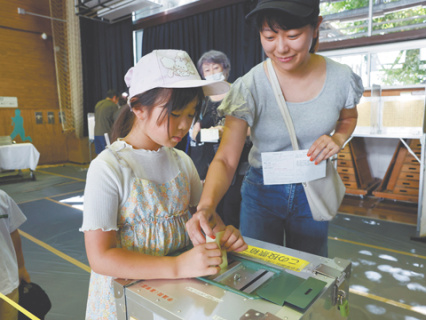
Japan is bracing for a period of political instability as Prime Minister Shigeru Ishiba’s ruling coalition faces a potential loss of its majority in the parliament’s upper house following Sunday’s elections. The setback casts serious doubt on the premier’s leadership and his government’s ability to navigate pressing domestic and international challenges, including a looming trade deadline with the United States.
The conservative Liberal Democratic Party (LDP), led by Ishiba, and its junior coalition partner, Komeito, needed to secure at least 50 of the contested seats to maintain control of the House of Councillors. However, initial exit polls from public broadcaster NHK suggested a fraught path, projecting the coalition could win a range of 32 to 51 seats. Other media forecasts painted an even bleaker picture, indicating a final tally of just over 40 seats, a significant blow to the government.
This electoral challenge comes at a time when the administration is already in a precarious position. The ruling bloc lost its majority in the more powerful lower house last October, the LDP’s worst result in 15 years. While the constitution allowed the government to continue, the loss left it vulnerable and a further defeat in the upper house would severely hamstring its legislative agenda and fuel uncertainty over its future.
Voter discontent has been fueled by a range of issues that the opposition has successfully capitalized on, including calls for tax cuts, increased social welfare spending, and stricter limits on immigration. The rise of right-populist parties like Sanseito, which campaigns against foreign investment and for traditional values, highlights a growing frustration with the LDP’s long-standing grip on power. As one 58-year-old voter, Kaoru Kawai, told reporters, “The LDP has been in power for too long and isn’t solving any problems.”
Compounding the domestic pressure is a high-stakes standoff with the United States, Japan’s key ally and primary export market. The Trump administration has threatened 25% tariffs, demanding a new trade deal be concluded by August 1. Washington has expressed frustration over the lack of progress in negotiations, particularly regarding Tokyo’s purchase of American cars and rice, a critical issue that could heavily influence the Ishiba government’s fate.
While a poor showing in the upper house does not trigger an automatic no-confidence vote, it cripples the prime minister’s authority. The result is expected to amplify calls from within the LDP for Ishiba to step down or seek new coalition partners to avoid political paralysis. Despite the LDP’s struggles, commentators note that the opposition remains too fragmented to present a unified, viable alternative, suggesting Japan may be heading for a period of political gridlock rather than a clean transfer of power.
